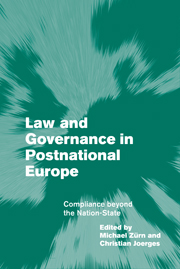Book contents
- Frontmatter
- Contents
- List of tables
- Notes on contributors
- Preface
- 1 Introduction: Law and compliance at different levels
- 2 The analysis of compliance with international rules: Definitions, variables, and methodology
- 3 State aid control at the national, European, and international level
- 4 Domestic limits of supranational law: Comparing compliance with European and international foodstuffs regulations
- 5 Politics of intergovernmental redistribution: Comparing compliance with European and federal redistributive regulations
- 6 Conclusions – the conditions of compliance
- 7 Compliance research in legal perspectives
- References
- Index
4 - Domestic limits of supranational law: Comparing compliance with European and international foodstuffs regulations
Published online by Cambridge University Press: 22 September 2009
- Frontmatter
- Contents
- List of tables
- Notes on contributors
- Preface
- 1 Introduction: Law and compliance at different levels
- 2 The analysis of compliance with international rules: Definitions, variables, and methodology
- 3 State aid control at the national, European, and international level
- 4 Domestic limits of supranational law: Comparing compliance with European and international foodstuffs regulations
- 5 Politics of intergovernmental redistribution: Comparing compliance with European and federal redistributive regulations
- 6 Conclusions – the conditions of compliance
- 7 Compliance research in legal perspectives
- References
- Index
Summary
Risk regulation in the EU and the WTO
The trade in foodstuffs is a particularly interesting candidate for the comparative analysis of compliance with inconvenient market-correcting rules. Analyzing foodstuffs policy underlines the fact that regulatory policy involves a number of difficult regulatory issues, such as the need to integrate expertise, the problem of dealing with conflicting points of view concerning those risks attributable to foodstuffs and/or nutritional habits, the growing importance of new concerns about animal welfare and the environmental dimensions of foodstuff production, as well as the impact of cultural traditions on production and consumption. Furthermore, because of their proximity to the everyday life of consumers, foodstuff issues rank prominently on the public agenda of domestic politics and, as such, can easily become politically sensitive issues.
A comparative analysis of compliance with foodstuffs regulations, however, is difficult to conduct across all three of the levels employed in this project. Due to the increasing relevance of European and international policies to the member states, important regulations are often authored by either international or European authorities (cf. Schlacke 1998; Hilf and Reuß 1997; and Ritter 1997) without reserving many competencies for the federal level. This chapter accordingly avoids conducting a comparison across all three levels and instead concentrates on comparing compliance with the rules of the World Trade Organization (WTO) with the compliance enjoyed by the rules of the European Union (EU).
- Type
- Chapter
- Information
- Law and Governance in Postnational EuropeCompliance Beyond the Nation-State, pp. 118 - 148Publisher: Cambridge University PressPrint publication year: 2005
- 3
- Cited by



